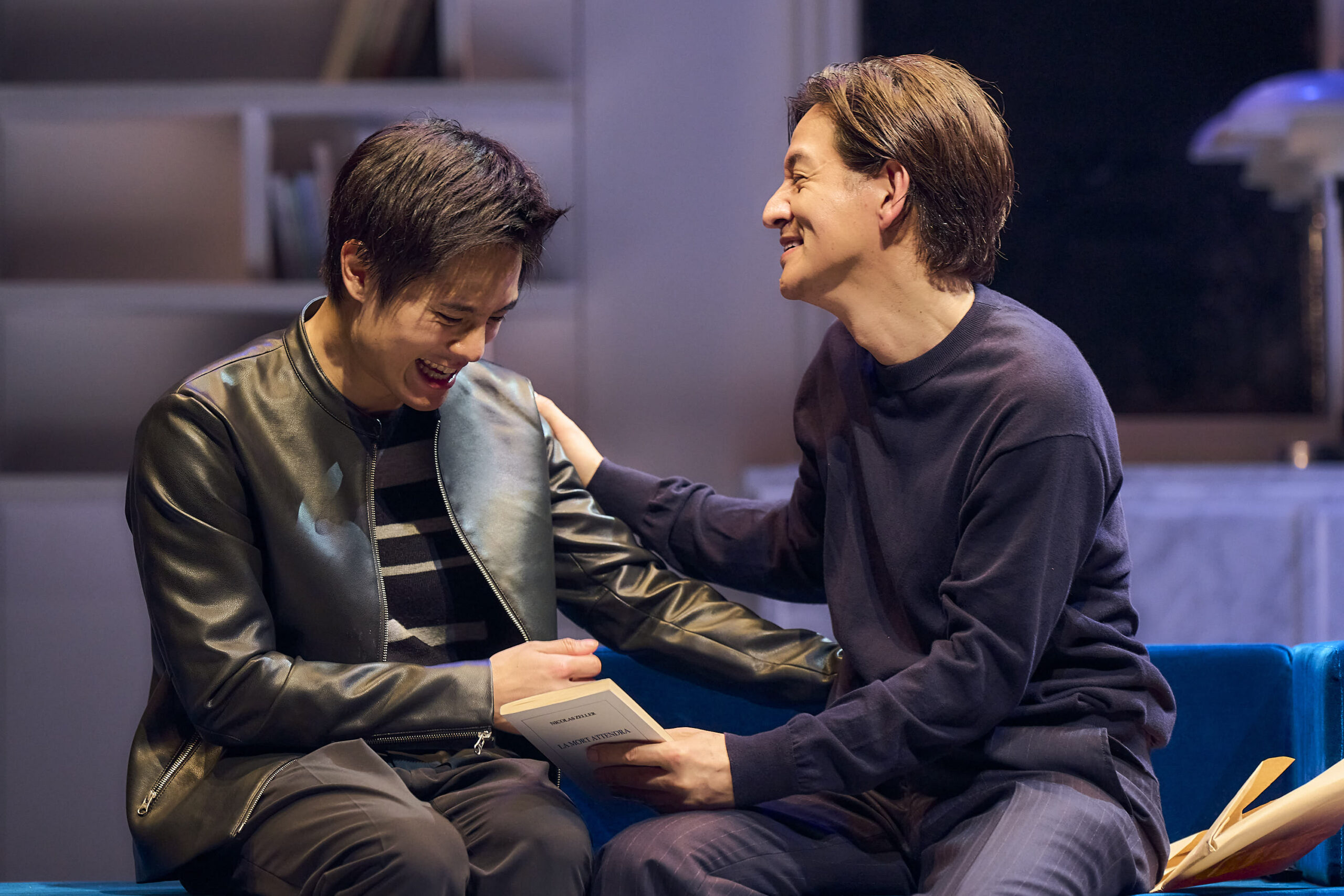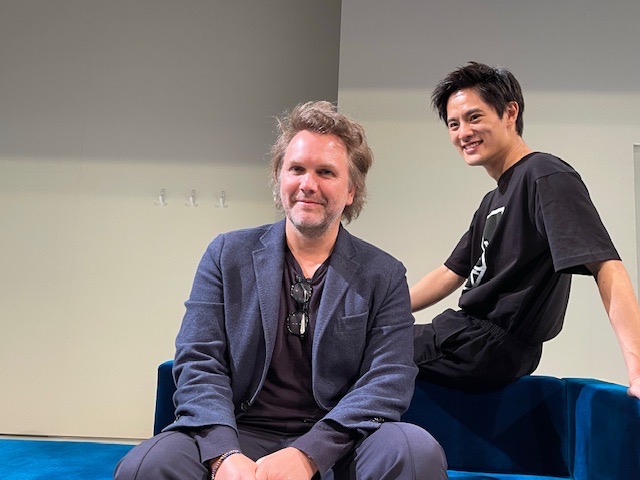
Florian Zeller and Keito Okamoto
The 44-year-old French novelist, playwright, film and theatre director Florian Zeller is one of the 21st century’s most celebrated creative talents.
Born in Paris, he was brought up by his mother and grandmother as his father worked and lived in Germany. However, he then shot to prominence with his family relationship drama trilogy of “La Mère” (“The Mother”; 2010), “Le Père” (“The Father”; 2012) and “Le Fils” (“The Son”; 2019).
In 2012 The Times, a leading British newspaper, described “The Father” as “one of the best plays of the century”. Then in 2020, his self-directed film of “The Father” with the famed British actor Anthony Hopkins in the title role won numerous awards including an Oscar for Best Adapted Screenplay.
In late May 2024, when JStages finally caught up with him, Zeller was visiting Japan for the first time to see the Japanese versions of “The Mother” and “The Son” staged with Japanese actors and directed by Zeller’s compatriot, Ladislas Chollat.
As we felt our way into this exclusive interview with Zeller and one of his leading actors, Keito Okamoto, the former pop star told Jstages.com that they spent their free time walking around Tokyo, looking at temples and enjoying the happy coincidence of being here at the best time to see the cherry trees blossoming.
“I felt that there is a kind of harmony in this country,” Zeller said. “To be honest, as I don’t speak Japanese I was a bit worried about seeing a performance in Tokyo, but my fear was completely groundless. The other day I saw ‘The Mother’ with Mayumi Wakamura in the title role, and though I have seen that play staged in many countries, Mayumi’s portrayal of the mother, Anne, was one of the best.”
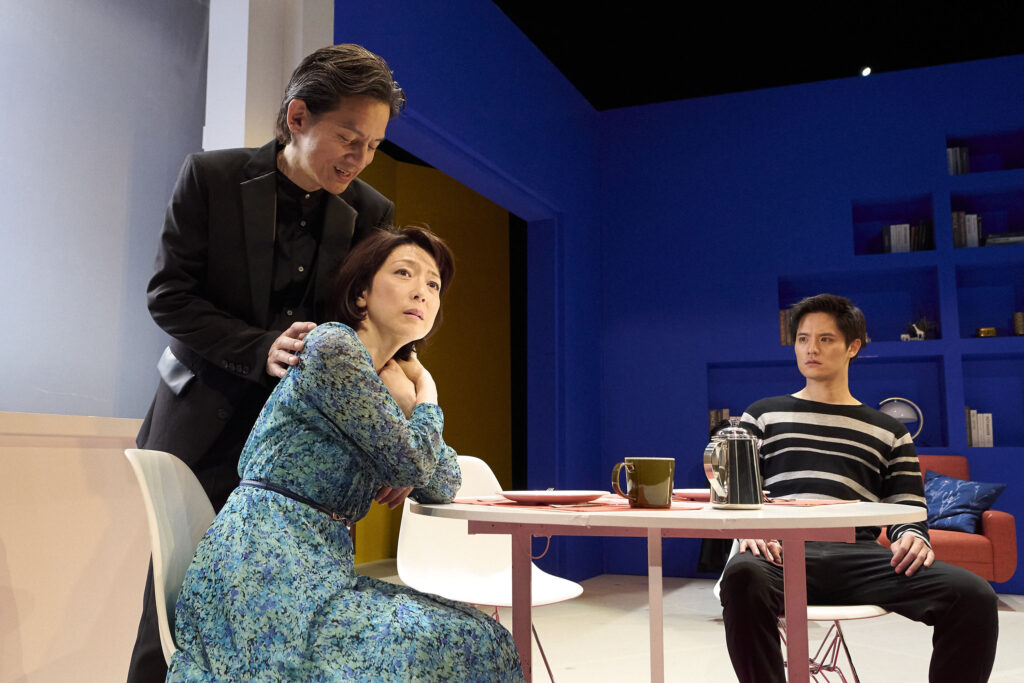
In “The Mother,” Kenichi Okamoto, Mayumi Wakamura and Keito Okamoto
JStages Q: Congratulations on the tremendous success of your productions. How did you feel when you had such huge applause in Tokyo at the curtain call of “The Son”?
Keito Okamoto (O): Building a role is work you only do by yourself and think about yourself. I always think about why Nicolas [the son] is thinking about those things. So in the curtain call I always feel relieved. I don’t really go back to being myself then, because the audiences prove that Nicolas is here and that makes me really happy and realize I did all that hard work and we all built this amazing play for the audiences in front of us. So, if the audiences are happy, we’re also very happy.
Q: I remember you were both chatting on Zoom when “The Son” premiered in Japan in 2021. Now that you’ve finally met here at the Tokyo Metropolitan Theatre, what kind of impression have you got of each other?
Florian Zeller (Z): I couldn’t come to Japan to see the play 2½ years ago, so that was why we talked on Zoom. Then, I felt Keito was fully committed, and I was so impressed about his attitude to the world. I immediately recognized him as someone who was special, deep and intense, and also he was a real artist. It means he was looking for something … you don’t need to know what that something is, but he was looking for something. He had deep thoughts.
Then I thought about Nicolas. He is 17 in the play, but somehow he seems like he’s also 100 years old. I think Keito is the same.
A few days ago, I met Keito and I was so happy to be here to see two plays. I’ve been really impressed by my whole experience, about the productions and the actors. The son in those two plays, which Keito acts in both, is both the son of the family and also a black hole in the family.
The intensity that I felt in Keito when I met him, and the beauty and his depth, I saw those things on stage and I have been really moved. Thank you, you are a great actor.
O: I want to say thank you, too. I nearly cried when I could finally meet you. Thank you so much for writing this play. I think this story needs to be told, especially in Japan because the rate of young children and young people committing suicide here is probably the highest in the world. So I think it’s very important for this story to be told in this country.
My motivation for acting this role is to stop people committing suicide. I think your words and how you have written the story make people think about that and can stop that kind of thing.
And I’m sure that’s not just my feeling. I definitely think there are lots of people in the audience who start to think about all this. Thank you very much for writing this play.
Z: Thank you for saying that. Actually, that is the reason why I wrote this play, because everybody’s stories are different and we are all different — but we have so many things in common, such as the fears of parents when they don’t know what they should do anymore to save or help someone who they love so much … and just don’t know how to do it.
That is a very painful feeling. I know so many people who went through this kind of thing. And it’s even more painful if you try to do it by yourself and you are the only one going through the situation, as you have lots of shame and guilt about the kid’s mental health issues.
People prefer to shy away from it. So the play is like an invitation to share emotions and TO see the complexity of someone who is in pain but we don’t know exactly why. Actually, the parents in this play are good people and they try hard to help their son. However, they don’t know how they can solve the problem.
Q: You said Nicolas is a black hole in the family. That’s a very interesting description.
O: When I acted this play 2½ years ago, I received a comment from someone in the audience who said he was saved by this story, and he was so pleased that we performed it because he realized he was not alone. I think that’s a very important thing because Nicolas was feeling alone and didn’t know what to do or why it’s like this … which is, as Florian said, a shame, and you’d prefer not to worry about such things, but this play does.
And people who saw this play had the same feeling. Feeling loneliness and alone is the worst emotion any person can have. By doing this play, and by someone in the audience feeling loneliness as Nicolas does can make them feel they’re not alone.
Z: I didn’t tell you before, but I received a text message a few weeks ago from someone who said he is one of your fans. He told me he saw “The Son” a few years ago and he said the reason he is still living in this world today is because he saw the play. It was extremely powerful for me to receive that kind of message.
And what you just expressed about sharing emotions and feelings of loneliness and discovering you are not alone is a powerful feeling that can save you.
That is the whole thing about theatre; to experience like that. We are a part of something bigger than just ourselves … which is humanity.
O: It’s very hard for me to do things for myself because I always want to do things for others. So that was the main motivation for me, and the reason I put so much into this play — because I want to change people who come to see it in the theatre.
I like telling stories that everybody needs. I am not like a person who has lots of opinions and declares them in a loud voice. Before I go on stage, I always empty myself and let the character sink into me and tell the story … I like doing that.
I think many words and lines in “The Son” are actually identical to my own life story. And on stage I am also actually performing this play with my real father.
My parents got divorced when I was 9, and after that I was far away from them because my father sent me to an English boarding school for my education. Since then I have come to understand why that happened — but I love my father and I love my mum, yet I was in England. I had the same kind of black hole Nicolas had.
When my parents divorced I heard that news from my father, but as a child I could not do anything; I couldn’t say anything and couldn’t hear any stories from my mum.
You know, there were so many words in “The Son” I always wanted to say to my father and my mum. So, when I first read it, I felt this was my story. However, I am now old enough and able to think about it differently, so I didn’t think in the same way as Nicolas’s problem.
I am sure there are lots of people in Japan and in the world who have those kinds of problems and the same feelings as Nicolas — just as I did when I was young.
So I used that emotion when I was building Nicolas’s character. It was an emotion I’d always shut inside me. But this play allowed me to open up … which was a very hard thing to do, but it was necessary to tell the story. I was able to do that.
So thanks to you the director, Ladislas Chollat, and also to you, Florian, the writer of this play, I was able to say the words and emotions I was never able to express to those I love.
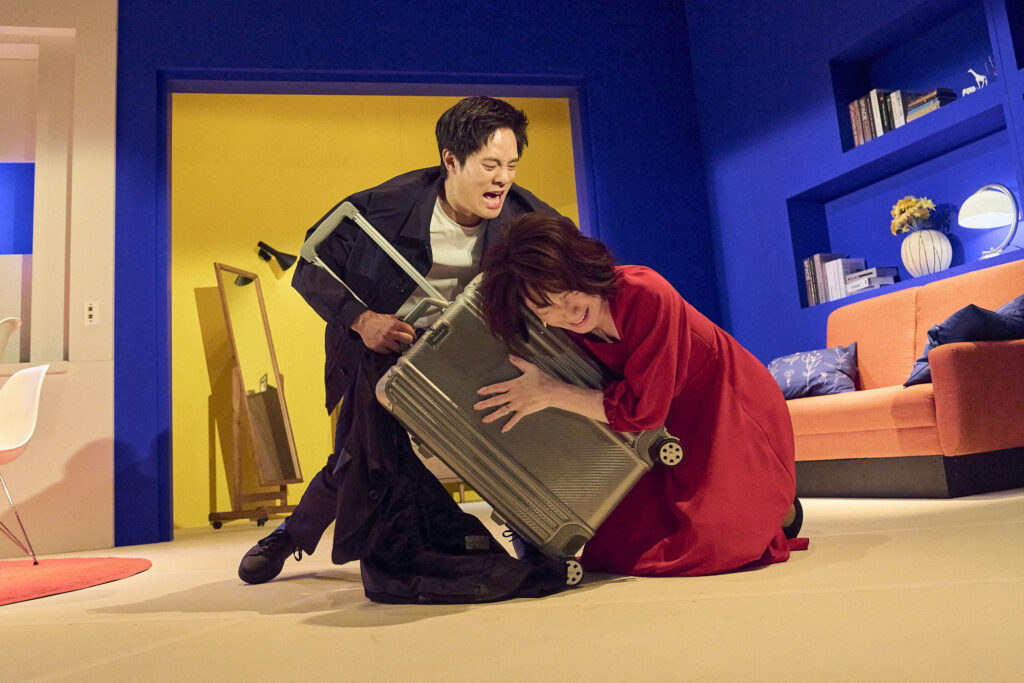
In “The Mother,” Keito Okamoto and Mayumi Wakamura
Q: Interestingly, you also said you usually write your plays from your own experience. Do you always work that way?
Z: Yes and no. It’s only when I finish writing a play that I realize what it was about. I’ve never tried to “say” something. I am trying to write, for example, like I am in a dream. So, it can go anywhere and anytime. Then, after it’s over, I think back and construct it again. But I try to be open to what could appear and anything could happen.
I don’t have any specific intention, and I want to leave an empty room for the audiences because everyone comes into a theatre with their own experiences. Through such rich experiences, they can understand and experience the stories on stage.
As an audience member I don’t like a story that’s entirely completed. I think it’s much more rewarding if, in the story, you/the audience can be part of the story. You have to question where the story goes and you act with the actors as an audience.
One of the reasons that it’s not mentioned why Nocilas is feeling the way he is, is because the audiences should try to understand that something is lacking and there is a mystery. Because life is a mystery. It’s a part of the beauty of it and the difficulty goingu through the life.
It depends very much on the country regarding mental health issues. For example, in the United States it’s very common to speak about mental health issues. In France, there is a lot of shame if someone goes to see a psychiatrist. In the US, though, you might be a bit ashamed if you don’t go to see a psychiatrist. (laugh)
O: Maybe it’s so cool in the US (laugh). In Japan, it’s totally not something to talk about. And that’s not only about mental health issues, but I feel it’s not normal for people to even express their emotions to anyone.
So I hardly ever talked about about myself to my father, saying I really feel like this, or I don’t think like that. We don’t do that in Japan.
As regards mental health issues, some Western ways are coming into Japan, but it’s not so common yet. So that’s why theatre should tell this story, I feel that’s necessary.
Q: Once you said you didn’t have a plan for a trilogy when you wrote “The Mother” in 2010. However, that became the first part of your family trilogy of “The Mother” “The Father” and “The Son.” How did that happen?
Z: As you mentioned, I first wrote “The Mother” without having any plan to write anything else. I didn’t know anything about how the work would be, but I remember one emotion about my mother that felt so lonely.
Once when we had a dinner together just after I’d had my boy and was looking after him, I remembered someone also did the same thing for a little baby who was me. Of course, it was my mother and I would have felt so ungrateful if I didn’t pay tribute to that. So somehow, “The Mother” is about my guilt, and about the son who didn’t come back home enough.
And then, “The Father” appeared. There was a brilliant old actor in France (Robert Hirsch), and I really wanted to work with him. He was 86 then, so I followed my desire to work with him. I was not told to write a play about dementia. Then I realized that I grew up with my grandmother. She started to suffer from dementia when I was 15, so the story was coming from there. But I never thought about her when I wrote that tragic play.
Then, I wanted to write a trilogy. I don’t know, but it’s like building a house, you know; it’s like a coherence. Also, I thought there would be an opportunity to create secret conversations between the plays. So I knew that the new play would be called “The Son”, and on my computer there was a new file named The Son. Of course, I didn’t know what it would be for years to come.
Then I went through difficult times with my son, and somehow the file was waiting for me. At last, the time arrived to write this play. It was waiting for me to explore the emotions and complexity of … taking care of someone else, loving someone else. So, the timing was waiting for me to explore my feelings.
So I always try to be open to whatever comes to me.
O: As soon as I read “The Mother”, I spoke to my mum because I felt the same way you said and I felt very ungrateful to my mother, so I spent some strong moments and times with her. I think that’s the power that this play has. It made me think about my mother. I think the audiences would think about their mothers. After I read “The Mother”, I went and spent time together with my real mother and stayed there a week. We had similar conversations like in the play “The Mother”, with my mother asking me “Would you like a cup of coffee?” and so on.
When I was with her, we watched the film “The Father” together. My mother’s father, my grandfather, passed away two years ago with dementia. After I watched it, I thought my grandfather might be thinking in that way and I understood why.
So I think all the stories of the trilogy are common to families around the world. I was so surprised that those French plays showed that Japanese also have same problems though the two countries have such different cultural backgrounds. Then I realized how amazing you are, Monsieur Zeller!
Q: In a recent interview, Keito, you said the key to “The Mother” was love. What did you mean actually?
O: I got a message from my mother, who came to see “The Mother” on the opening night. She said if I had not been in England, she would definitely have become Anne. She would not let me go, and she would not let other people take me somewhere as she loved me so much.
I was in England and I was in a special environment — as my father was a famous actor and I was going around his places, so I was able to get lots of love from those people. Then my mother told me two days ago: “I am sorry I was not hugging you when you were a child.” She said she could not hug me because she thought she would become like Anne.
Z: Really? I suppose it must have been so painful for her to have her son so far away.
O: In one interview I said “love” is a key, because I was thinking about the intensity of the mother. I thought this Nicolas in “The Mother” was more complicated than Nicolas in “The Son”. Because I was not sure whether he actually existed or not. First I didn’t know why he would do that kind of action to his own mother. I had a conversation with Chollat and he always said everything comes from love. If you love someone too much … my mother said you can’t love someone too much, and I said to her: “You loved me too much.”
You know, love is a very important emotion that humans can get, but if it’s too much, something will happen.
You can be aggressive to someone who you love, but you can’t be aggressive to the person who you don’t know. I was thinking about what was in Nicolas’s deep mind … it was his love for his mother and his father.
Z: In “The Son”, Nicolas is facing a difficult period, and in “The Mother,” he’s going through love deception. As a father or a mother, you have to accept that these things could happen and that’s a paradox when it comes to love, because when you love your son or daughter, you want to protect them from everything, but that’s impossible.
This is what it is about in “The Son.” There is a limit there. So, to love a child is also to let him or her have their own life. For a mother or father, it would be painful to let their loved one go. But love is sometimes about letting someone go.
Life is full of contradictions.
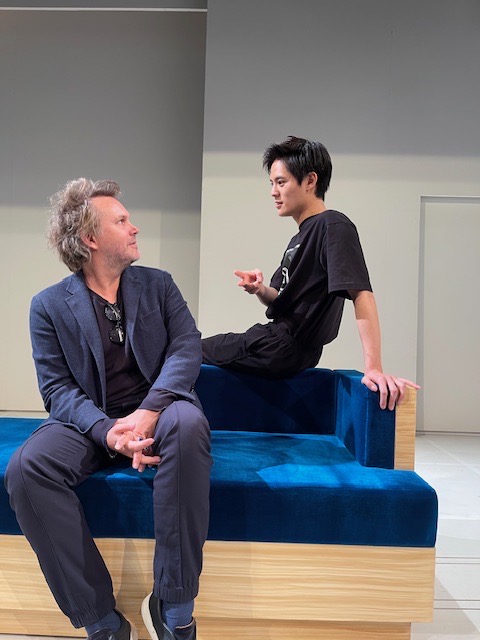
Florian Zeller and Keito Okamoto
Q: This is the first project to run “The Son” and “The Mother” at the same time. What would be the extra benefit of seeing both plays at the same time?
O: For me, it’s very special to do both plays. Both plays are very special and both stories need to be told, I believe. I think it’s quite fun for the audiences. One of my friends came to see “The Mother” last night and he came back this afternoon to see “The Son.” He enjoyed seeing two different plays acted by the same actors.
Z: In “The Mother”, there are several scenes that may appear to be the same because the same situations are repeated, but they are slightly different and they are not the same. It’s like a repetition of music. It looks like it’s the same, but it’s not the same. You would feel strange in your brain. And I think that kind of thing adds to those plays.
So the common point of those two plays works in the same way because scenes are repeated in “The Mother.” Yet even though the same characters are acted by the same actors, the two situations are not exactly the same. So it’s a way to question what is reality and how you perceive it from your viewpoint. Speaking as an audience member, this project is very special and it’s the first time it’s happened to me.
O: I am on stage every day. Every day I played Nicolas, but it never goes the way I might expect. It always ends up somewhere I never imagined. I think that’s theatre. You experience something that you would never expect hand every day I feel different.
Zeller said one day that he never writes a plot before he writes a play. He just lets it flow. So I feel exactly the same when I play Nicolas. It always ends up in a place I never expected.
Production details: https://www.lefils-lamere.jp/

